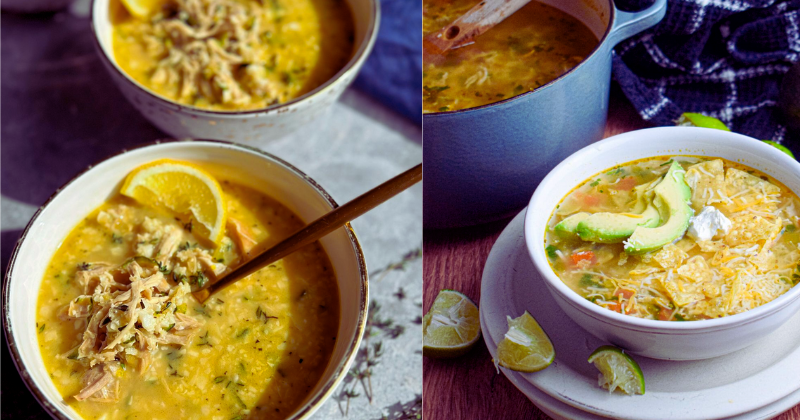Prep Time: 20 minutes | Cook Time: 40 minutes | Total Time: 1 hour | Difficulty: Easy | Serves: 6-8
Table of Contents
I’ll never forget the magical afternoon I spent in my Greek friend Sofia’s kitchen, watching her grandmother Yiayia effortlessly transform simple ingredients into the most soul-warming Mediterranean lemon chicken soup I’d ever tasted. As the fragrant steam rose from the pot, carrying notes of fresh herbs, bright lemon, and tender chicken, I understood why this soup had been healing her family for generations. What captivated me wasn’t just the incredible flavor – it was how this Mediterranean lemon chicken soup seemed to embody pure sunshine in a bowl, bringing comfort and vitality in equal measure. Every spoonful delivered layers of brightness from fresh lemon juice, warmth from aromatic herbs, and the kind of nourishing satisfaction that only comes from food made with love and tradition. Whether you’re battling a winter cold, seeking comfort after a long day, or simply craving something that feeds both body and soul, this recipe captures the essence of Mediterranean cooking at its finest – simple ingredients transformed into something extraordinary through time-honored techniques and generous amounts of heart.
Why You’ll Love This Recipe
This Mediterranean lemon chicken soup offers five compelling reasons to make it a staple in your comfort food repertoire. First, it’s surprisingly easy and beginner-friendly – while the flavors are sophisticated and complex, the cooking techniques remain straightforward, making it perfect for weeknight dinners when you want something special without restaurant-level complexity. The one-pot nature means minimal cleanup while maximum flavor develops through gentle simmering.
What truly sets this homemade soup apart is its incredible health benefits and family-friendly appeal – packed with lean protein, immune-boosting vegetables, and the vitamin C power of fresh lemons, it’s comfort food that actually nourishes your body while satisfying your soul. Children love the bright, clean flavors while adults appreciate the sophisticated herb blend that makes every spoonful interesting.
The versatility factor makes this recipe a year-round winner – it’s light enough for spring and summer meals yet comforting enough for cold weather comfort. Unlike heavy, cream-based soups that can feel overwhelming, this Mediterranean version refreshes while it satisfies, making it perfect for any season or occasion.
Finally, this soup offers exceptional make-ahead convenience and freezer-friendly storage, actually improving in flavor after a day as the herbs and lemon meld together. The impressive presentation and restaurant-quality taste make it suitable for both casual family dinners and entertaining guests, giving you a reliable showstopper that consistently delivers satisfaction and compliments.
Ingredient Insights & Selection
The success of your Mediterranean lemon chicken soup begins with selecting quality ingredients that capture the bright, fresh essence of Mediterranean cuisine. Choose bone-in, skin-on chicken thighs for the most flavorful broth – the bones add richness while the dark meat stays tender during longer cooking times, never becoming dry like white meat can. If you prefer white meat, chicken breasts work but require more careful timing to prevent overcooking.
Fresh lemons are absolutely crucial for authentic flavor – you’ll need both juice and zest, so choose lemons that feel heavy for their size with bright, unblemished skin. Meyer lemons offer exceptional sweetness if available, though regular lemons work perfectly. Avoid bottled lemon juice, which lacks the brightness and complexity that fresh lemons provide.
Your herb selection defines the Mediterranean character – fresh oregano, thyme, and parsley create the classic flavor profile, while bay leaves add depth during simmering. Fresh herbs make a significant difference over dried versions, though you can substitute dried herbs using one-third the amount if fresh aren’t available.
The vegetable foundation should include onions, carrots, and celery for aromatic base, while orzo pasta or rice adds heartiness without overwhelming the bright flavors. Extra virgin olive oil provides authentic Mediterranean richness and carries flavors beautifully throughout the soup.
For substitutions, vegetarians can use vegetable broth with added mushrooms for umami depth, while those avoiding gluten can substitute rice for orzo pasta. Egg noodles work as another pasta alternative, though cooking times will vary. Store fresh herbs wrapped in damp paper towels in the refrigerator, keep lemons at room temperature for maximum juice yield, and use chicken within two days of purchase for optimal safety and flavor.
Key Techniques & Method Overview
Mastering Mediterranean lemon chicken soup requires understanding four essential techniques that ensure optimal flavor development and perfect texture balance. The proper searing technique creates foundational flavor by browning chicken pieces until golden before adding liquid – this caramelization adds depth impossible to achieve through simmering alone. Look for rich, golden-brown color and listen for active sizzling that indicates proper heat levels.
The aromatic building method layers flavors by cooking onions, carrots, and celery until softened, then adding garlic and herbs to release their essential oils. This sequence prevents burning delicate aromatics while maximizing flavor extraction. The vegetables should smell fragrant and look slightly caramelized around edges when ready for the next step.
Temperature control throughout the cooking process determines final texture quality – initial high heat for browning transitions to gentle simmering that keeps proteins tender while extracting maximum flavor from bones and vegetables. Aggressive boiling toughens chicken and creates cloudy broth, while insufficient heat fails to properly extract flavors. The ideal simmer produces occasional lazy bubbles breaking the surface.
The lemon integration technique requires careful timing to preserve brightness – lemon juice added too early can become bitter and lose its vibrant flavor, while lemon zest can be added earlier to infuse the broth with citrus oils. The final acid addition should happen off heat or during the last few minutes of cooking to maintain that fresh, bright character that defines this soup. Visual cues include chicken that shreds easily with a fork and broth that tastes balanced between savory depth and bright acidity.

Step-by-Step Instructions
- Sear the chicken and build flavor base (12 minutes): Heat 3 tablespoons olive oil in a large Dutch oven over medium-high heat. Season 2 pounds bone-in chicken thighs with salt and pepper, then brown skin-side down for 5-6 minutes until golden and crispy. Flip and brown the other side for 3-4 minutes. The skin should release easily when properly seared. Remove chicken and set aside. In the same pot with remaining oil, add 1 diced large onion, 2 sliced carrots, and 2 sliced celery stalks, cooking until softened, about 4-5 minutes.
- Create the aromatic foundation (3 minutes): Add 4 minced garlic cloves, 2 tablespoons fresh oregano (or 2 teaspoons dried), 1 tablespoon fresh thyme, and 2 bay leaves to the vegetables. Cook, stirring constantly, for 1-2 minutes until fragrant – the mixture should smell intensely aromatic with no raw garlic scent remaining. This step releases the essential oils that will flavor the entire soup.
- Build the soup base (25 minutes): Return browned chicken to the pot and add 8 cups low-sodium chicken broth. Bring to a boil, then reduce heat to maintain a gentle simmer. Cover partially and cook for 20-25 minutes until chicken is fork-tender and easily shreds. Skim any foam that rises to the surface for clearer broth. The chicken should fall off the bone when touched with a fork.
- Shred chicken and add pasta (8 minutes): Remove chicken pieces and let cool slightly, then discard skin and bones, shredding meat into bite-sized pieces. Return shredded chicken to the pot and bring soup back to a gentle boil. Add 1 cup orzo pasta and cook according to package directions, typically 7-9 minutes, until tender but still with slight bite. The pasta should be perfectly al dente, as it will continue cooking slightly in the hot broth.
- Finish with lemon and herbs (5 minutes): Remove bay leaves and reduce heat to low. Stir in the juice of 2 large lemons (about ⅓ cup), 2 tablespoons lemon zest, and ¼ cup chopped fresh parsley. Taste and adjust seasoning with salt, pepper, and additional lemon juice as needed. The soup should have a bright, balanced flavor with clear lemon brightness complementing the savory chicken broth. Let rest for 2-3 minutes to allow flavors to meld before serving.
Pro Tips & Troubleshooting
These insider secrets guarantee your Mediterranean lemon chicken soup achieves restaurant-quality results every time. First, don’t skip the chicken browning step – this single technique adds incredible depth that can’t be replicated through simmering alone. If your chicken skin isn’t releasing easily from the pot, it needs more time to develop proper caramelization.
Prevent cloudy broth by maintaining gentle heat throughout cooking and skimming foam regularly during the first 10 minutes of simmering. If your broth does become cloudy, strain it through a fine-mesh sieve lined with cheesecloth, though this removes some body along with the cloudiness.
For pasta that doesn’t become mushy in leftovers, slightly undercook it initially, as it will continue softening in the hot broth. Alternatively, cook pasta separately and add it to individual bowls when serving, keeping the soup base and pasta separate for optimal texture control.
Combat bland flavors by tasting and adjusting throughout cooking – the soup should be well-seasoned before adding lemon juice, as acid can mask salt perception. If your finished soup tastes flat despite proper seasoning, add lemon juice gradually until the flavors brighten and become balanced. A small amount of white wine vinegar can substitute if additional lemon makes the soup too acidic.
Variations & Customizations
Transform your basic Mediterranean lemon chicken soup into exciting variations that showcase the flexibility of this healing recipe. For heartier appetites, add diced potatoes with the vegetables or substitute rice for orzo to create a more substantial meal. Greek-inspired versions can include kalamata olives, crumbled feta cheese, and fresh dill for authentic Hellenic flavors.
Create a vegetarian version using vegetable broth with added mushrooms for umami depth, white beans or chickpeas for protein, and extra vegetables like zucchini or spinach for nutrition. The lemon and herb combination works beautifully without meat, creating a light yet satisfying soup perfect for plant-based diets.
Seasonal adaptations keep the soup interesting year-round – add fresh asparagus and peas in spring, zucchini and tomatoes in summer, or winter greens like kale and escarole during colder months. Each addition should complement rather than compete with the bright lemon base.
For gluten-free needs, substitute rice, quinoa, or gluten-free pasta for the orzo. Double the recipe easily for meal prep or large families, though you may need to extend cooking times slightly for larger batches.
Storage, Reheating & Make-Ahead Tips
Mediterranean lemon chicken soup stores exceptionally well and actually improves in flavor after a day as the herbs and lemon continue melding together. Refrigerate leftovers in airtight containers for up to 4 days, though note that pasta will continue absorbing liquid and softening over time. The soup base without pasta can be refrigerated for up to 5 days.
For optimal texture when reheating, add a splash of additional broth or water to compensate for liquid absorbed by pasta. Reheat gently on the stovetop over medium-low heat, stirring occasionally, and refresh with a squeeze of fresh lemon juice to restore brightness. Microwave individual portions work for convenience, stirring halfway through heating.
Make-ahead preparation offers tremendous flexibility – the soup base can be made up to 3 days in advance without adding pasta, then completed when ready to serve. This actually allows flavors to develop more fully while preserving pasta texture.
Freezer storage works beautifully for up to 3 months, though freeze the soup base without pasta for best results. Add fresh pasta when reheating to prevent mushy texture. Thaw frozen soup overnight in the refrigerator, then reheat gently, adding fresh herbs and lemon juice to restore the bright, fresh character.
Serving Suggestions & Pairings
Present your Mediterranean lemon chicken soup with accompaniments that enhance its bright, healing qualities while maintaining the Mediterranean theme. Classic pairings include warm, crusty bread for dipping – focaccia, pita, or a simple baguette work beautifully. Olive tapenade or hummus provide additional Mediterranean flavors that complement without overwhelming.
For beverage pairings, crisp white wines like Sauvignon Blanc or Pinot Grigio enhance the lemon flavors without competing, while light rosés provide elegant accompaniment. Non-alcoholic options include sparkling water with lemon, herbal teas, or even Greek-style coffee for an authentic cultural experience.
Complete meal planning works best when this soup serves as a light main course alongside Mediterranean-inspired sides. Consider Greek salad with fresh vegetables and feta, roasted vegetables with olive oil and herbs, or simple grain salads that provide nutritional balance while maintaining the fresh, healthy theme.
For elegant presentation, garnish individual bowls with fresh herbs, a drizzle of good olive oil, or crumbled feta cheese. Lemon wedges on the side allow diners to adjust brightness to their preference while adding visual appeal.
This Mediterranean lemon chicken soup represents the perfect fusion of comfort and vitality, proving that healing food doesn’t have to sacrifice flavor or sophistication. Whether you’re seeking nourishment during recovery, looking for a lighter alternative to heavy comfort foods, or simply wanting to bring the sunshine flavors of the Mediterranean to your table, this recipe delivers consistent results that satisfy both body and soul. The beauty lies not just in its incredible taste and healthful properties, but in its ability to transport you to sun-drenched Greek islands with every spoonful, creating moments of joy and nourishment that extend far beyond the meal itself. Ready to bring this liquid sunshine into your kitchen and discover why Mediterranean cuisine has been healing families for generations? Gather those lemons and fresh herbs, and prepare to create the most uplifting soup experience of your culinary journey!

